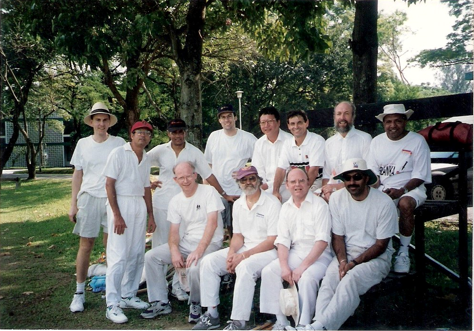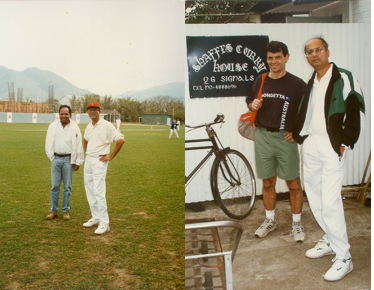“Do you play cricket?” – by GEORGE BRAINE

The job interview was at a hotel room in San Diego, during a major academic conference. A few chairs had been lined up outside the room, and, as I sat there, another applicant who had just been interviewed walked triumphantly out of the room, giving a dismissive glance in my direction. Rather dejectedly, I walked in.
The room had two arm chairs and a large bed. Three white males, who turned out to be Americans, were waiting expectantly, the oldest seated on a chair and the other two on the bed. They were the interview committee. I was directed to the second chair. I was not surprised by the arrangement. Years before, while facing multiple job interviews at another academic conference, I had been in stranger interview scenarios.
The person seated on the chair turned out to be the director of the ELT Unit, a renowned professor, who I knew by reputation, but the others were strangers. One was a roly-poly, jowly Mid-Westerner, and the other a lanky, younger person, who turned out to be an instructor. But, despite my face not matching my name, (the name is Western, but the face and skin color are not), they didn’t appear surprised. The interview proceeded smoothly. The usual questions – about my qualifications, publications, teaching experience – were asked. After about 15 minutes, as I was getting ready leave, the roly-poly guy raised a hand and said, “I have one more question. Do you play cricket?”
I nearly fell off my chair. This question was beyond my wildest expectations. At an interview for an academic job, conducted in the United States by three Americans, I was being asked about a very British sport, cricket. I didn’t even expect them to know about the game. In shock, I could only retort “Of course I do. I am Sri Lankan. Do you”?
The roly-poly guy threw up his hands, as if in horror, and said “Oh no! But my friend Pradip wanted me to ask you.” And that, readers, is how I got an English teaching job in Hong Kong. I spread that line after arriving in Hong Kong, and some people actually believed it!
BTW, Pradip was an instructor in the ELT Unit who played cricket for the staff team. He had seen my job application and made the connection between a Sri Lankan and cricket. And I did play a lot of cricket for the university I joined.
This is how it went. A lengthy fax would arrive about once a week, sent to all cricketers of the university, announcing an upcoming game and asking if we could play. Sent by the captain David, the University Bursar, who didn’t use email. A few days later, we would receive another fax, listing the players and the admonition to dress in white “to intimidate the opposition”, a strategy which rarely worked. I wondered what David’s secretary, a Hong Kong Chinese who perhaps knew nothing about cricket, thought of her additional duties as the convener of the cricket team.
We were an eclectic side. The Bursar was English, and we had a Scottish pharmacologist, a Malaysian surgeon, a Sri Lankan chemical pathologist, a Canadian sports scientist, an English biologist, an Indian English teacher, an Australian veterinarian, another surgeon who was English, medical and business types from various nationalities, and me. Our average age would have been around 50. We never practiced but that didn’t matter; the aim was to enjoy the game.
Only a 20-minute drive from the campus, Sek Kong was our favorite grounds. I caught a ride in a large 1960s light-blue Mercedes owned by Mano, the other Sri Lankan, gliding majestically along the Tai Po Road, Tolo Highway, and Lam Kam Road which ran along a beautiful valley of village houses and orchards. Sek Kong was a Royal Air Force camp, which had a cricket grounds, and a smartly attired Gurkha guard would raise the barrier and let us through.

Our first act was to visit Shaffis Curry House, a few yards from the entrance, to open a “chit” or a credit account for the day. Shaffis was run by Liaqat Ali, from Pakistan, but everyone called him Shaffi. Located in an unpretentious structure, Shaffis served a range of North Indian delicacies – tandoori chicken, chicken tikka, samosas, mutton kebabs – (British servicemen’s favorite Indian food), to be slurped up with the naan bread and gulped down with cans of Tiger beer. Shaffi was a cricket nut, and lurked around hoping for a chance to play. So when we were short of a player, he was our choice. Nothing pleased him more.
The Sek Kong camp, out in the countryside, was a lovely location for our games. The well-maintained grounds, with a clubhouse at one end and rolling blue hills in the distance, was bordered by tall, shady trees on one side. Supporters and wives of some players, who also acted as scorers, preferred to sit in the shade of these trees. Being an air force camp, we could hear light aircraft taking off and landing not far from the cricket grounds. With the backdrop of the bluest skies, parachutists and hang gliders slowly drifted over the grounds to land nearby. The sounds of mild jubilation as a boundary was scored, a catch taken, would occasionally fill the air. Those afternoons were magical.

Shaffis was only a few yards from the grounds, so we would nip across for a quick samosa and a beer while the cricket was on. In any case, beer was the main item when drinks were brought to the players. At the end of the game, both teams and supporters would retire to Shaffis for a sumptuous meal, accompanied by loud talk and much laughter. The lovely ambience of the grounds and Shaffis made Sek Kong perhaps the most attractive cricket venue in Hong Kong. We never lacked for opposing teams!
Mano was known less for his cricket prowess than for the fun he brought to every game. He would open batting but not last long at the crease, getting out to a rash shot. The occasional boundary would bring a quick, wild dance from him. And when he fielded, usually far from the batsman, we could all see an open beer can in his hand or sitting on the grass nearby! We had to give a warning yell, “MANO, BALL!” before he saw it coming his way.
David, the captain, a Cambridge Blue in cricket, was also our wicket keeper and often the top scorer. He was close to retirement. We played 35-over games, so David would have to squat and stand, squat and stand, behind the wicket, not missing a catch or allowing the stray ball to go past him. We expected big hitting from the veterinarian, a tall, well-built man, but he barely lifted his bat. Another memorable player was the pharmacologist, in thick glasses, who never missed a game and was a fine fielder near the boundary. The English surgeon, who performed reconstructive work, preferred to keep wickets after David retired. I was concerned about injuries to his fingers, but he didn’t seem to care.
Our most frequent opponents were the Sri Lanka Casuals team, the City University of Hong Kong, and the Legal Eagles, a team consisting of middle-aged lawyers. Here’s the report of a typical game.
Match with City University of Hong Kong CC
“Last Sunday was a perfectly glorious day for cricket, made more glorious, I’m happy to say, by the gallant performance of our team. No, we didn’t inflict a humiliating defeat on our opponents; but neither did we suffer one ourselves! One could say, we battled valiantly, and then yielded the match–not our honor–to a technically more advantaged side. Composed entirely of Chinese University campus affiliates, our team took on City University, composed, save for their captain, almost entirely of unaffiliated, inappropriately-youthful guest players. Batting first, the Chinese University opening pair, made up of Mano and David Johns, gave the team a splendid start by frustrating every effort by the bowlers to dislodge them. They were followed by some sterling performance by George and Saunders, who together defied a spell of rather uncompromising bowling by the opposition, leaving the field on their own terms after knocking up 36 runs each. The next four batsmen took the total to 162 by the 35th over, and given the lack of practice, they too put up a creditable performance.
Chinese University then went in to field, sorely missing our regular wicket-keeper and erstwhile captain, David. There was some good bowling and two good catches, but we couldn’t keep City University from surpassing our total by the 28th over.” [End of quote]
With the handover of Hong Kong to Mainland China, the Royal Air Force left Sek Kong base. That was the end of cricket at Sek Kong grounds. Shaffi had to move out and started another restaurant in a town further north.
The Oscar-winning English film and stage director Sam Mendes (of “American Beauty” fame), who still plays cricket, claims that the joy of cricket is “not necessarily the batting or the bowling, [but] the hours spent in the outfield just being part of the game, being both inside and outside of it, allowing the mind to wander and yet being there as part of the team.” Exactly!
Enjoying the cricket, not merely to win, and being with like-minded people, the easy comraderies, made the cricket in Hong Kong memorable. Those lazy afternoons were some of the happiest, most carefree times of my life in Hong Kong.
GEORGE BRAINE







